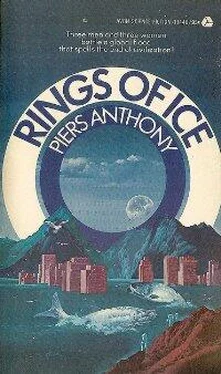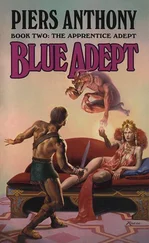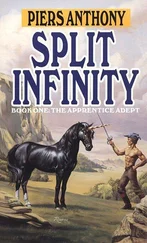“No way to stop it,” Gordon said. “It’ll float right on out to sea.”
But fate intervened again. Before Thatch caught up, the bus snagged on something under the surface, rotated in a quarter circle, and hung there, bobbing gently. It was off the highway, but no longer drifting with the current.
They came up to it again, four heads showing above murky water. “Thatch, I told you to get this bus across!” Gus called irritably from the interior. He was still sitting on the engine cover between the front chairs.
Zena quelled another flash of emotion: rage or mirth, or both. She knew she was overreacting. Was the man totally impervious to reason? “I’m sure he is doing his best,” she said, with what irony she was not certain herself.
Thatch considered, then swam away. The others clung to the bus uncertainly. Zena didn’t have the gumption to challenge Thatch on where he was going; it could be a plan to save the motor-home, or merely a call of nature.
“Well, let’s get inside for now,” Gordon said.
They splashed around to the door, Gordon helping Karen, who looked wan. Zena reached it first—and met another aggravation. It would not open.
“Gus, don’t be childish!” she cried, exasperated.
But Gordon fathomed the problem. “It’s not him, it’s the water. The pressure’s holding it shut.”
“And if we do yank it open,” Karen pointed out, “all the water will pour inside and sink the ship.”
Zena laid her head against the metal. “What are we going to do?”
“Use the window,” Gordon said. “That’s how I came out. I’ll boost you up.”
Karen went first, wriggling through with Gordon supporting her fleshy legs and Gus getting whatever grip he could on her robust upper torso. Watching that, Zena had second thoughts about her mode of entry. “You go next,” she said to Gordon. “Then you can help me in from inside.”
Gordon didn’t need boosting. For all his effeminate preferences, he was a well-conditioned man. He hauled himself up and through with minimum trouble.
Still, Zena lingered. “We’re forgetting Thatch! Maybe I should wait here—”
“Suit yourself,” Gordon said amenably. “But if you get cold, I’ll spell you.” He looked about inside. “We’ll have to do some bailing; that engine cover’s still leaking. Karen, why don’t you perch on it, and I’ll find a bucket…”
Zena was cold, but didn’t care to admit it. They waited, more or less helplessly. Buckets of water flew out the window to merge with the rain: Gordon was at work.
In due course Thatch returned. He bore several long poles that he had evidently fashioned from saplings.
“Oars!” Zena cried, comprehending.
“We still have to carve them flat,” Thatch said. “But they won’t fit inside.”
“Well, do it outside!” Gus snapped from the window.
“Why don’t you come out and do it yourself?” Zena snapped back.
Gus looked down at her, amazed. “And get wet?”
She thought he was joking then realized with a sick feeling that he was not. They might all drown for lack of manpower, but big Gus would not get wet.
Zena shrugged and looked at Thatch. “Have another knife?”
He did. First they had to float the poles back to shore, where they could be worked on. This was simply a matter of supporting the forepart of one’s body on the wood and kicking the feet. It was against the current, but not too difficult.
The air, as she came back into it from her submersion, seemed chill. Was the rain cooling, or was it just her? She hoped she wasn’t coming down with any illness. That would be all they needed now: a contagious disease.
They worked on the oars side by side, sitting astride them and pushing the kitchen knives away two-handed. It was awkward, but seemed to get the job done with minimum risk. A bad slip, a gash across the wrist—that could be fatal!
But she was growing unnecessarily morbid, looking for pretexts to feel sorry for herself, when there were plenty of real problems to occupy her attention!
“Thatch,” she murmured, suspecting that he would not hear her through the beat of rain, and half hoping for that.
“Yes?” he replied.
All right: out with it! “Karen—I saw her inject herself with something last night.”
He paused. “I’d better tell Gus.”
“No, you idiot! What use would he be?”
“He knows what to do.”
“What is it with you two?” she cried “You do all the work. He’s nothing but a parasite.”
“He does his part.”
“His part! What’s his part? Conspicuous consumer?”
“He leads.”
“Some leadership! He won’t even poke his nose outside.”
“Well, it’s wet outside.”
“Oh come on now, Thatch!”
He didn’t answer, and she didn’t push it. When the knife began to dull Thatch showed her how to sharpen it with a little whetstone he had, and the laborious work continued.
When they had four oars, they got up. Zena’s hands were cramped and hurting; there would be blisters. Now for the swim back.
“About time!” Gus called as they drew alongside.
“Don’t you know that every hour makes it worse? We have to reach high ground.”
“We can put the oars through the windows, and row,” Thatch said. “It won’t matter how deep the water gets.”
“You have no anchorages in the windows,” Gus said.
Zena was fleetingly amused to see how the normal roles of the two men had reversed. Now Gus was protesting while Thatch gave answers.
“I’ll take care of that,” Gordon said. “I’ve been considering the layout. We’ll have to nail some blocks in.”
“Then we can’t close the windows!” Gus said. “The rain will come in.”
So that was it: Gus was really concerned about his personal comfort. True to form after all!
“I’ll remove the blocks once we’re back on land,” Gordon said. “It’ll get wet in here—but that’s the least of evils.”
“The rugs! The furniture!” Gus exclaimed.
Gordon ignored him. “Pass in an oar handle, folks, so I can piece this out. We need room for the oarsmen, too.”
“There are no blocks,” Gus said.
“We’ll have to cut some lengths off the ends of the oars,” Gordon said.
They had no saw, so had to carve off segments with the knives. Thatch was good at this, though Zena saw that his hands were badly blistered; he had cut down the trees this way, too. More time was lost, while the rain rained. Zena was afraid the bus would float off its impediment before they were ready. She decided not to voice this thought, however. What could they do about it except worry?
But the water level now seemed to be constant, though the rain never abated. Apparently the broad flow sufficed to keep it stable, here—for the time being. Gordon, with much hammering and unladylike swearing, got the makeshift apparatus done.
At last they were ready for the big effort. Gordon helped Zena in, and Thatch stayed outside to make sure the oars were functioning correctly. Zena and Karen had the rear pair; they braced their feet against the back panel of the bus and sat facing rearward on the two side couches, holding on to the heavy awkward oar handles. Gus had the dinette-alcove oar; he was seated similarly on the bed set there. Gordon stopped bailing, set a box of shoes, wet clothing and other artifacts on the engine panel to help hold it down, and took the kitchen oar. He had the hall to move in.
“Now push down and forward on your oars,” Thatch called from behind. “That lifts them up and forward, outside.”
Zena tried. It was like wrestling a rigid snake. The leverage was all against her.
She wasn’t the only one; Karen was struggling valiantly to master her oar, and finally got it pinned under her body. A banging up front indicated that at least one of the men was having trouble too.
Читать дальше










